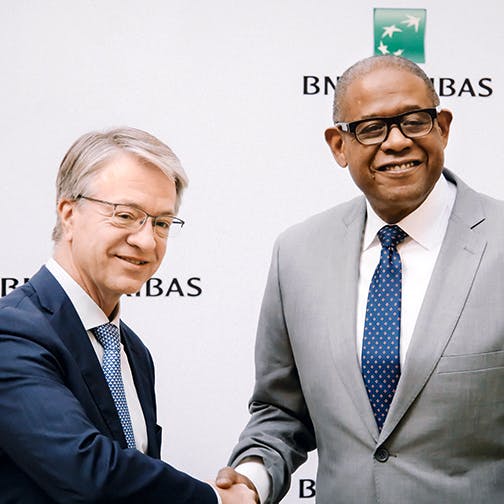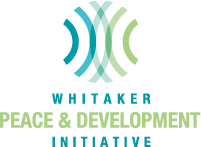
Forest Whitaker and Jean‑Laurent Bonnafé on December 14 2018, at the signing of the partnership between the WPDI and BNP Paribas.
Artist and social activist, founder and CEO of the Whitaker Peace & Development Initiative (WPDI), UNESCO Special Envoy
Since 2018, BNP Paribas has been supporting Whitaker Peace & Development Initiative (WPDI) education and entrepreneurship programmes in the United States and South Africa. In 2021, the Group chose to extend its sponsorship to Mexico and France (Seine‑Saint‑Denis).
You are mainly known as an actor, but you are also the UNESCO Special Envoy for Peace and Reconciliation, a member of the United Nations Advocacy Group for Sustainable Development Goals (SDGs) and the President of the Whitaker Peace & Development Initiative (WPDI). Created in 2012, this NGO mainly acts as a peacemaker in countries affected by violence and poverty. Why did you create this NGO?
I grew up in South Central, in Los Angeles, a very disadvantaged black neighbourhood, where I saw too many young people caught up in gangs, prison and sometimes death. My family pushed me to focus on my studies, and I was able to escape such a fate. But some questions I wondered about in my youth have never left me. I ended up having a revelation on the set of The Last King of Scotland in Uganda. I met former child soldiers who told me about their pasts and notably the ideas they had to make their communities more peaceful. I was struck by this because I recognised my stories in theirs and, at the same time, these young people told me that they wanted to be seen as more than just victims or perpetrators of violence. They wanted to be seen as agents for peace and change. The idea for WPDI started from there: to provide young people from difficult backgrounds with the tools and resources they themselves can use to develop sustainable solutions.
You are a famous international personality. Does this position help you in your work as an activist, and how do you reconcile these two roles?
This position plays a certain role. It allows me to open doors and gain a few moments of extra attention to convince people. But I do not believe that people would listen to me speak about my humanitarian work if I were not deeply convinced of its importance. This is what allows me to reconcile my roles as an artist and an activist.
Ultimately, I want to reach people, and my two “careers” are two different ways of doing that.
What types of partners do you work with in the field (associations, governments, companies, etc.) and how do you identify them?
In the field, we work with all types of partners – national or local governments, associations and international organisations. What matters to us is effective action and sustainable results. It is on this basis that we identify our partners so that our programmes fit into the non‑profit and institutional landscape of the regions where we operate (South Sudan, Uganda, South Africa, Mexico, and the United States).
How does a partner such as BNP Paribas support you in the field, and what role do you think large companies should play in these challenges?
BNP Paribas supports us as our main partner in Seine‑Saint‑Denis, France; in Cape Town, South Africa and in Mexico. BNP Paribas also supports us by helping us, for example, to forge partnerships with local players or by offering internships or even temporary positions to our young people. In South Africa, BNP Paribas commissioned a statistical survey to help us better understand the impact of violence in Cape Town. The top managers from the South African branch also gave their time by participating in the mentoring programme for our young leaders. I think these actions are good examples of the leverage effects that a large company can provide to strengthen the impact of an organisation like WPDI in the regions and for the benefit of the communities that need it.

